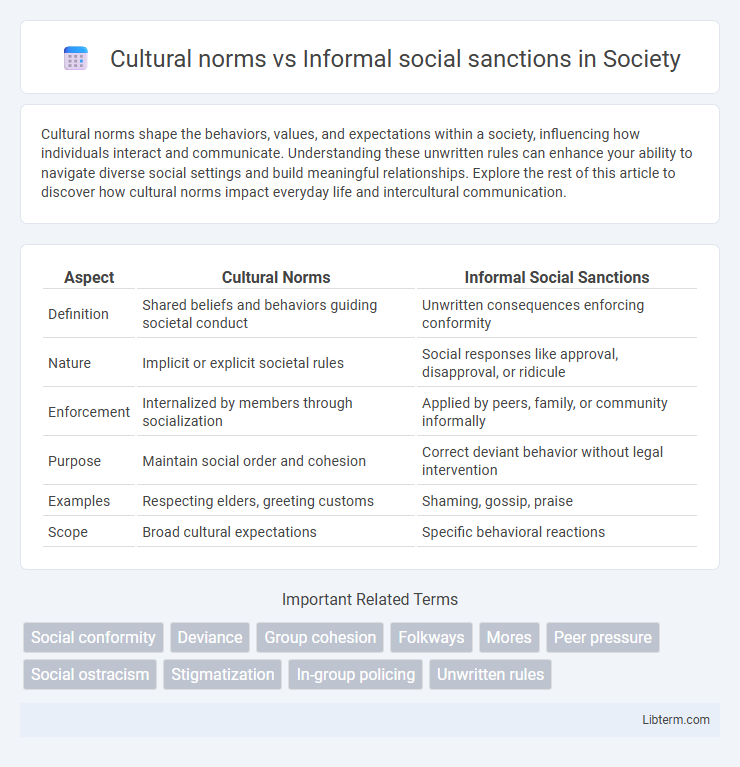Cultural norms shape the behaviors, values, and expectations within a society, influencing how individuals interact and communicate. Understanding these unwritten rules can enhance your ability to navigate diverse social settings and build meaningful relationships. Explore the rest of this article to discover how cultural norms impact everyday life and intercultural communication.
Table of Comparison
| Aspect | Cultural Norms | Informal Social Sanctions |
|---|---|---|
| Definition | Shared beliefs and behaviors guiding societal conduct | Unwritten consequences enforcing conformity |
| Nature | Implicit or explicit societal rules | Social responses like approval, disapproval, or ridicule |
| Enforcement | Internalized by members through socialization | Applied by peers, family, or community informally |
| Purpose | Maintain social order and cohesion | Correct deviant behavior without legal intervention |
| Examples | Respecting elders, greeting customs | Shaming, gossip, praise |
| Scope | Broad cultural expectations | Specific behavioral reactions |
Introduction to Cultural Norms and Informal Social Sanctions
Cultural norms refer to the shared expectations and rules that guide behavior within a community, shaping individuals' actions and social interactions through implicit understanding. Informal social sanctions are the subtle, non-institutionalized responses such as approval or disapproval used by members of a society to enforce these norms and maintain social order. Together, they form an interconnected system where cultural norms dictate acceptable behavior while informal social sanctions ensure compliance without formal punishment.
Defining Cultural Norms: Foundations of Group Behavior
Cultural norms are shared expectations and rules guiding the behavior of individuals within a group, rooted in collective values, beliefs, and traditions. They establish the foundation for group behavior by delineating what is considered acceptable and unacceptable, shaping social interactions and maintaining social order. Informal social sanctions arise naturally from these norms, enforcing compliance through mechanisms like approval, ridicule, or ostracism without official authority.
Types of Cultural Norms: Folkways, Mores, and Taboos
Folkways are informal cultural norms that guide everyday behavior, such as dress codes and etiquette, often enforced by mild social sanctions like ridicule or social exclusion. Mores represent more serious norms related to morality and ethics, where violations can lead to stronger social sanctions, including public condemnation or legal consequences. Taboos are the most entrenched cultural prohibitions, often involving actions considered morally repugnant or forbidden, with violations provoking severe informal sanctions such as ostracism or intense social stigma.
Understanding Informal Social Sanctions
Informal social sanctions are unwritten rules and reactions that guide individual behavior within cultural norms by rewarding conformity and punishing deviance through social disapproval, exclusion, or ridicule. These sanctions operate through everyday interactions and community enforcement rather than formal laws, reinforcing shared values and expectations. Understanding informal social sanctions is essential for analyzing how cultures maintain social order and influence personal conduct without institutional intervention.
Mechanisms of Informal Social Sanctions in Society
Mechanisms of informal social sanctions in society primarily involve social exclusion, gossip, and ridicule, which enforce adherence to cultural norms without formal authority. These sanctions rely on community observation and shared values to regulate behavior by creating social pressure and potential loss of reputation. Such informal controls are crucial for maintaining social order by subtly discouraging deviance and reinforcing collective expectations.
The Interplay between Cultural Norms and Social Sanctions
Cultural norms shape collective expectations and behaviors within societies, while informal social sanctions enforce these norms through subtle pressures like gossip, ridicule, or exclusion. The interplay between cultural norms and social sanctions ensures conformity by reinforcing shared values without formal legal measures. This dynamic relationship maintains social order and influences individual decision-making by embedding cultural expectations into everyday interactions.
Real-World Examples: How Norms and Sanctions Shape Behavior
Cultural norms, such as the Japanese practice of bowing to show respect, establish expected social behaviors that guide individual interactions within a community. Informal social sanctions, including subtle social ostracism faced by someone who violates norms like not participating in communal festivals, reinforce adherence by signaling disapproval without formal penalties. Real-world examples demonstrate that these unwritten rules and consequences work together to maintain social order and influence behavior across diverse societies.
Cultural Variation: Differences Across Societies
Cultural norms vary significantly across societies, shaping expectations of behavior that are deeply rooted in historical, religious, and social contexts. Informal social sanctions, such as gossip, ostracism, or praise, enforce these norms differently depending on the cultural environment, reflecting variations in collectivism and individualism. Understanding these differences is crucial for cross-cultural communication and social integration, as what is acceptable or punished in one society may be perceived differently in another.
Consequences of Violating Norms and Facing Sanctions
Violating cultural norms often results in informal social sanctions such as social exclusion, gossip, or ridicule, which serve to reinforce communal values and behavior standards. These sanctions vary widely depending on the cultural context and severity of the breach, ranging from mild disapproval to significant damage to one's social reputation. Consequences may affect personal relationships, professional opportunities, and community standing, emphasizing the powerful role of informal social sanctions in maintaining social order.
Evolving Norms and Sanctions in Modern Societies
Evolving cultural norms in modern societies increasingly reflect diversity and inclusivity, shaping behaviors that are accepted or discouraged within communities. Informal social sanctions, such as peer pressure or social exclusion, adapt alongside these shifting norms to enforce conformity without formal legal intervention. This dynamic interplay highlights how societal values transform continuously, influencing everyday interactions and social cohesion.
Cultural norms Infographic

 libterm.com
libterm.com